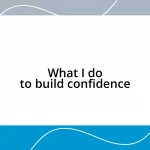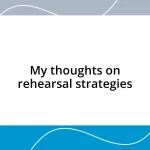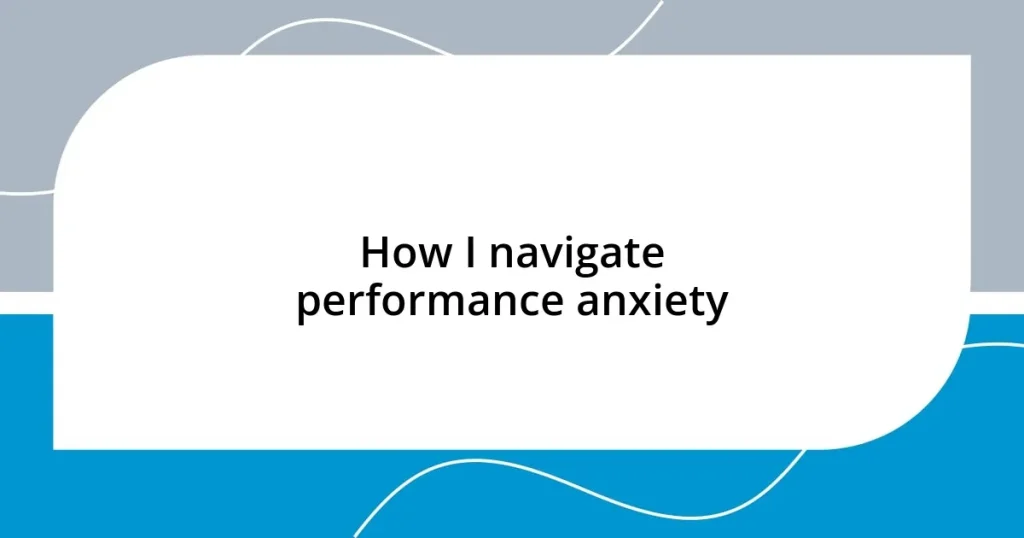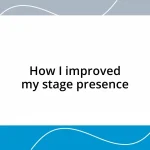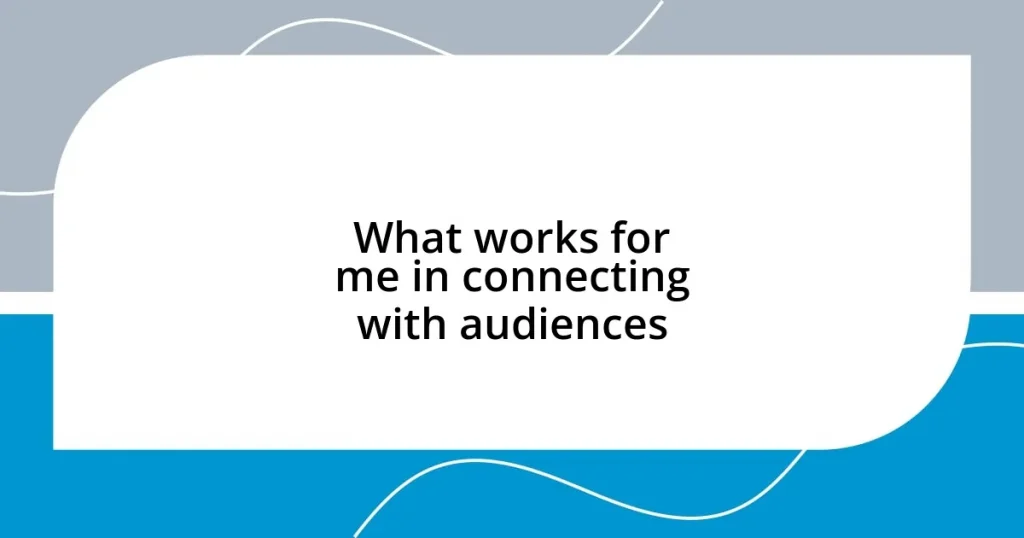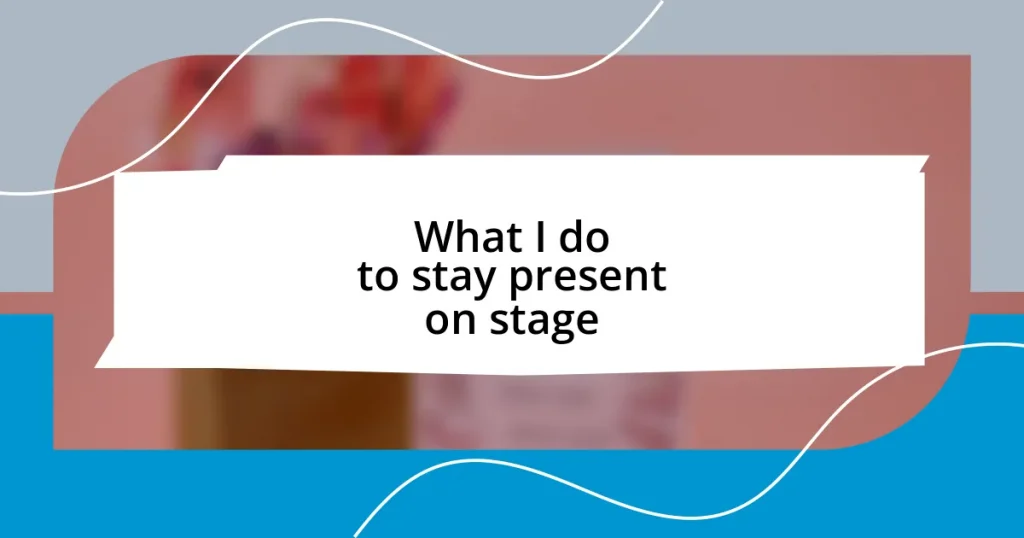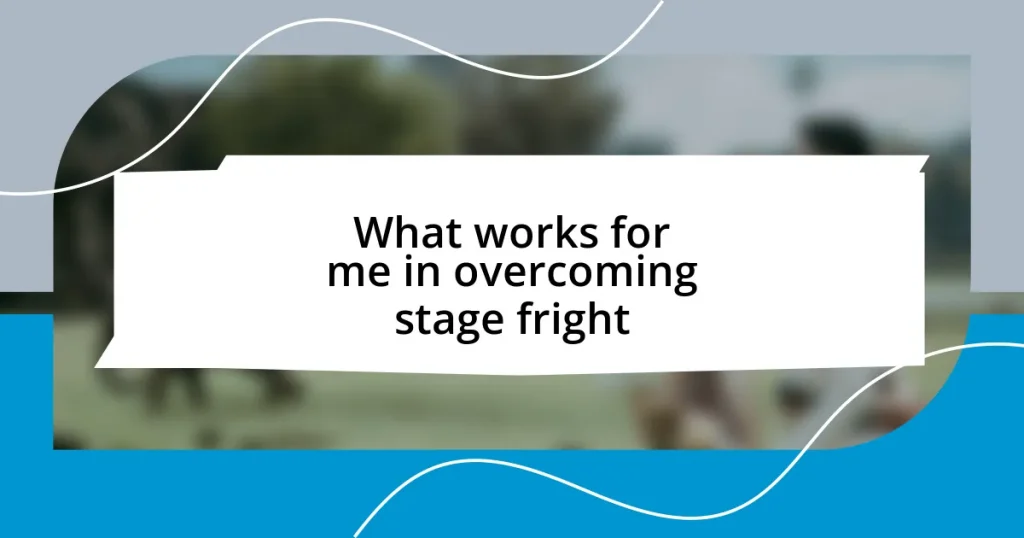Key takeaways:
- Performance anxiety is common and often linked to fear of judgment, perfectionism, and lack of preparation.
- Recognizing physical signs of anxiety, such as increased heart rate and negative self-talk, can help in managing it effectively.
- Techniques like deep breathing, visualization, and thorough preparation can significantly alleviate performance anxiety.
- Seeking professional help can provide valuable coping strategies and shift perspectives on anxiety, turning it into motivation.
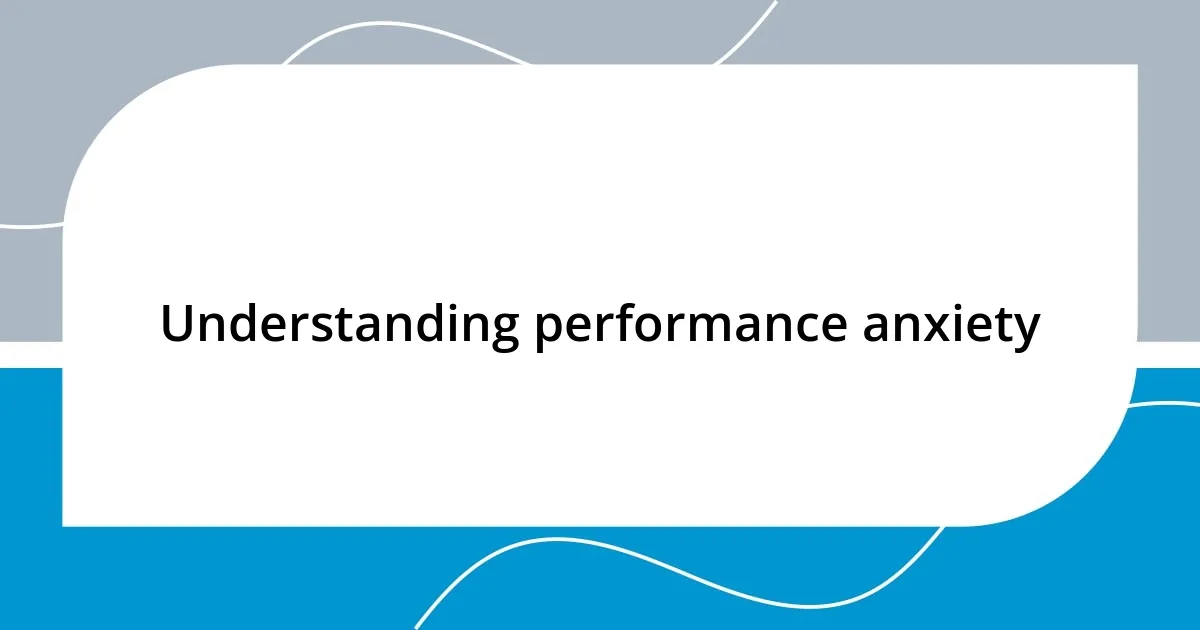
Understanding performance anxiety
Performance anxiety can feel like a monster lurking in the shadows, waiting to pounce right before you step into the spotlight. I remember standing on stage, heart racing, feeling as if everyone’s gaze was a spotlight burning through my confidence. It’s a very real experience that many grapple with, often leading to self-doubt and overthinking.
Have you ever felt that knot in your stomach just thinking about an upcoming presentation or performance? For me, that anxiety often shows up as an incessant inner dialogue, questioning my abilities and worthiness. It can be paralyzing, making each moment leading up to a performance feel like an eternity filled with “What ifs?” that spiral into doubt rather than excitement.
Understanding the roots of this anxiety is crucial. I’ve learned that it’s often tied to the fear of judgment or failure, which isn’t just a personal battle; it’s shared by countless others. This awareness has helped me realize that I’m not alone in this struggle, and that recognition often takes away some of the power that anxiety holds over us.
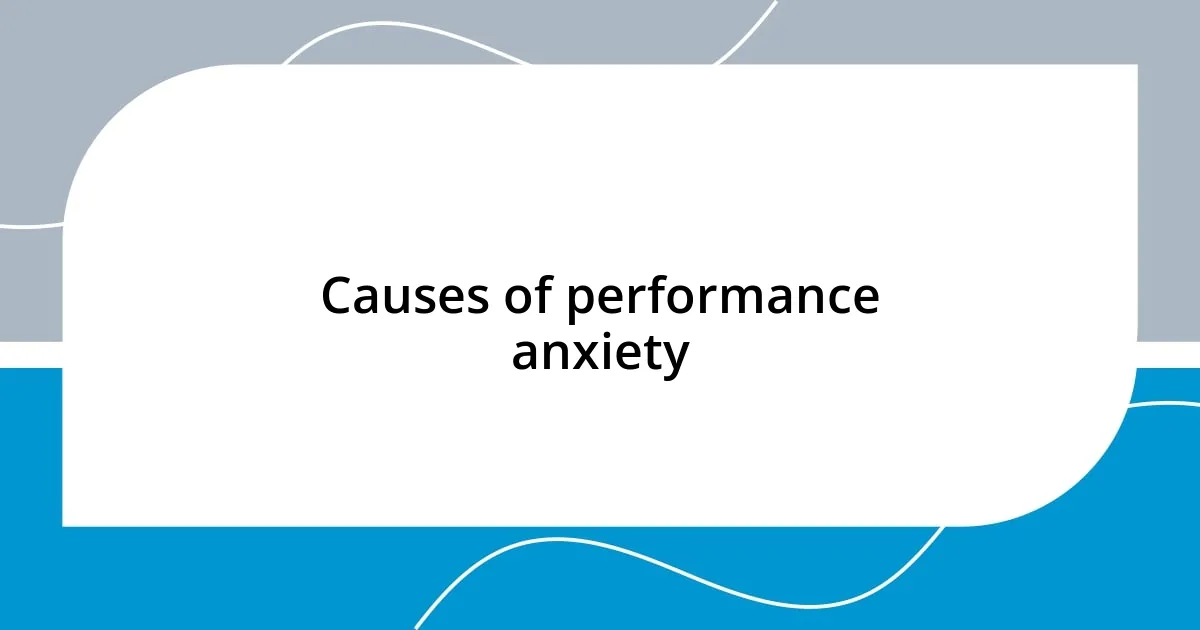
Causes of performance anxiety
Performance anxiety can stem from various causes, each intertwining to amplify feelings of unease. One major factor I’ve observed is perfectionism. I remember pouring over every detail of my presentations, convinced that anything less than flawless would lead to shame. This relentless pursuit of perfection often leaves me feeling paralyzed, as I question whether I can ever meet my own impossibly high standards.
Another significant contributor to performance anxiety is the fear of judgment from others. In my earlier days, the thought of having someone critique my performance was daunting. I’d replay negative remarks in my head, letting them overshadow any positive feedback I once received. It’s interesting how a single comment can echo in our minds, shaping our self-perception and heightening anxiety.
Lastly, a lack of preparation can act as a double-edged sword. In my experience, if I go into a situation feeling unprepared, my anxiety skyrockets. The moment I step onto the stage or into the meeting room, uncertainty grips me, and I can feel the weight of expectation amplifying my fears. It’s a reminder of how crucial it is to equip ourselves well in order to face those daunting moments with confidence.
| Cause | Description |
|---|---|
| Perfectionism | The relentless pursuit of flawlessness that can hinder performance. |
| Fear of Judgment | The anxiety stemming from the possibility of being critiqued by others. |
| Lack of Preparation | The heightened anxiety that arises when one feels unready for a performance. |
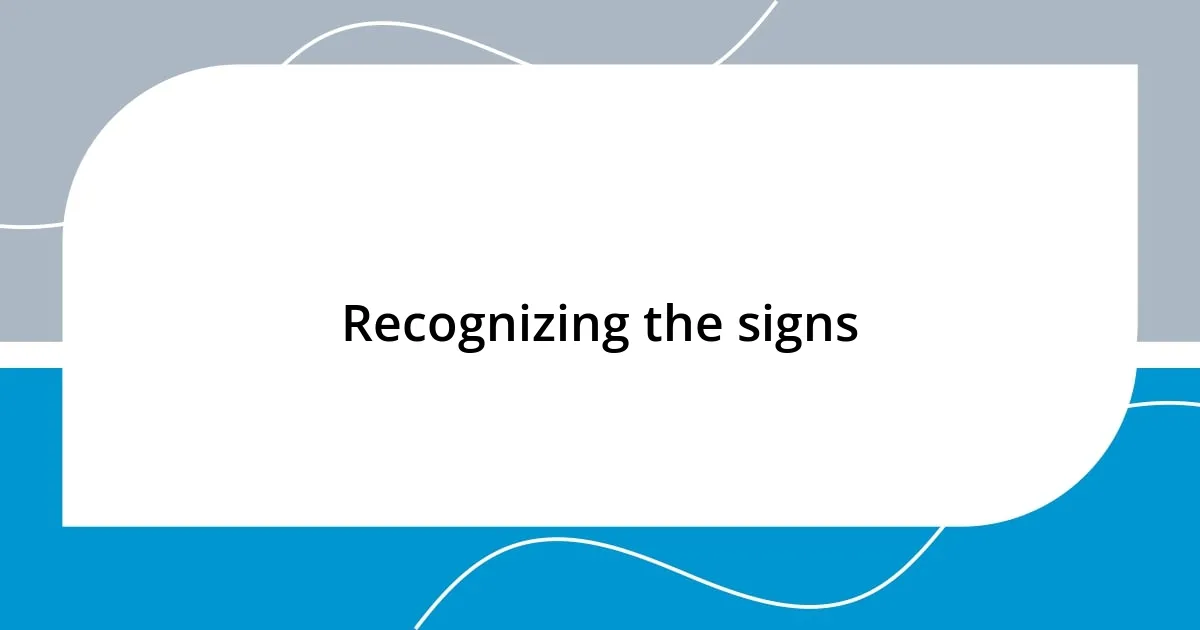
Recognizing the signs
Recognizing the signs of performance anxiety can be a game-changer in managing it effectively. I’ve often found that my body gives me clues long before my mind acknowledges the anxiety. Those subtle shifts in my physical state—like tension in my shoulders or a dry mouth—signal that something isn’t quite right. Once I started paying attention to these symptoms, I realized that understanding them was the first step toward alleviating the stress.
Here are some common signs to look out for:
- Increased heart rate: I can feel my heart racing, almost as if it’s trying to escape my chest.
- Sweaty palms: It’s strange how those little droplets can burst forth when I’m about to perform.
- Negative self-talk: I often hear a loop of criticisms playing in my head, which can amplify the anxiety.
- Trembling hands or voice: It’s almost automatic for me; I can feel the shakes creeping in as the moment approaches.
- Nausea or butterflies in the stomach: The physical manifestation of my worries becomes almost unbearable at times.
By identifying these signals early, I’ve been better equipped to manage the anxiety before it spirals out of control. Acknowledging how I feel isn’t a sign of weakness; it’s part of the journey toward reclaiming my confidence.
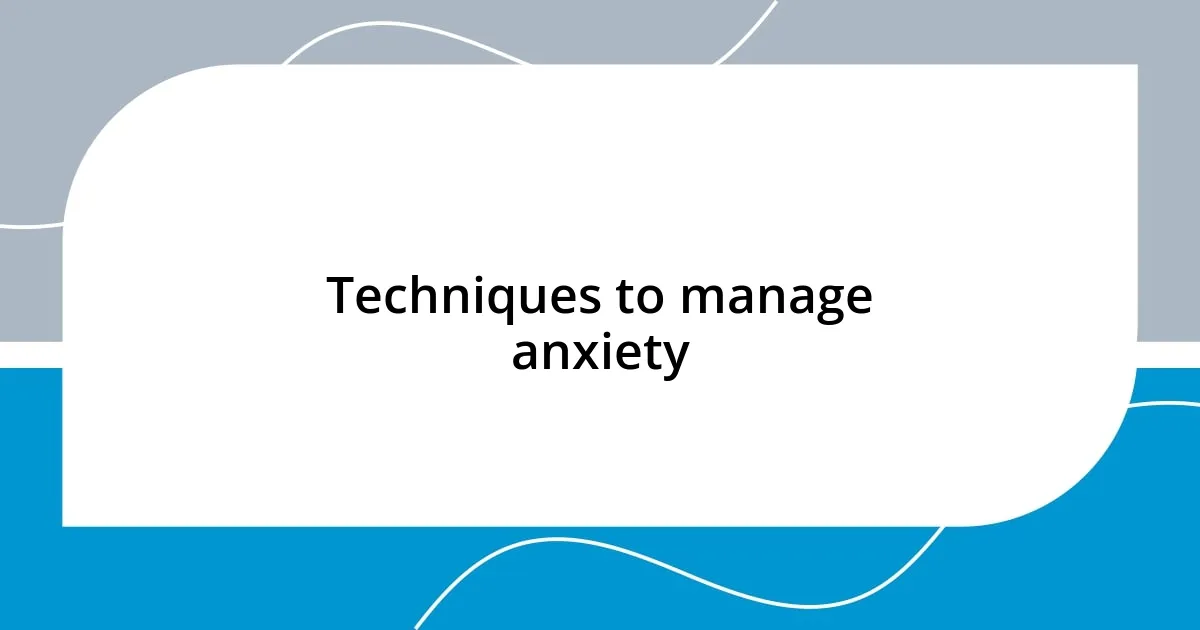
Techniques to manage anxiety
When it comes to managing performance anxiety, I’ve found that one of the most effective techniques is deep breathing. In those tense moments before stepping on stage, I pause to take a few slow, deep breaths. I’ve experienced the calming effect it has on my racing heart, almost like hitting a reset button. There’s something about focusing on my breath that shifts my attention away from the anxiety and grounds me in the present moment.
Visualization is another powerful tool I cherish. I vividly picture myself succeeding in whatever performance is ahead. Sometimes, I close my eyes and imagine the audience applauding, which strangely transforms my anxiety into excitement. It’s a simple shift in thinking, but it makes a world of difference. Have you ever tried visualizing your success? If not, I encourage you to give it a shot—your mind might just surprise you.
Lastly, I’ve learned the importance of preparation and practice. Each time I took the time to rehearse thoroughly, I felt more at ease, like I had armed myself with the right tools to face scrutiny. The brain tends to remember familiarity, so I often realize that the more I engage with the material, the less apprehensive I become. When I think back to instances where I felt prepared, I can’t help but recall how much smoother my performances were. It’s astonishing how confidence blossoms from a bit of diligent preparation, isn’t it?
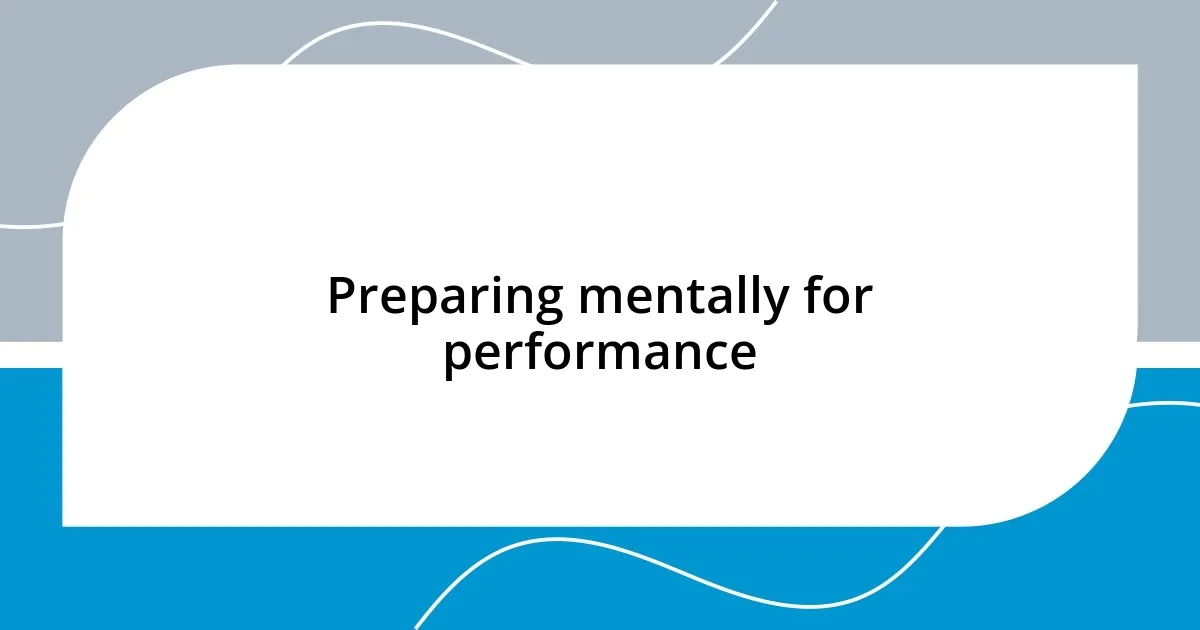
Preparing mentally for performance
Getting into the right headspace before a performance is crucial for me. I remember one time when I was on the verge of an important presentation, and I could feel the anxiety bubbling up inside me. Instead of pushing those feelings aside, I sat quietly for a moment, closed my eyes, and replayed the scenes of a successful delivery in my mind. That simple act of mental rehearsal not only calmed my nerves but also reinforced the vision I wanted to bring to life.
I’ve also discovered that affirmations can be powerful allies in mental preparation. I often find myself standing in front of a mirror, looking straight at my reflection, and reminding myself of my capabilities. “You’re prepared; you can do this,” I tell myself, and it never fails to spark a sense of empowerment. It’s fascinating how changing my internal dialogue shifts my mindset—are you nurturing your thoughts before stepping into the spotlight too?
Finally, I believe establishing a pre-performance routine can set the tone for success. I’ve started adopting a ritual where I listen to my favorite empowering song and take a few moments to stretch. This brief yet intentional time allows me to channel my energy positively. What do you do right before you perform? Finding that rhythm might just be the key to unlocking your best performance.
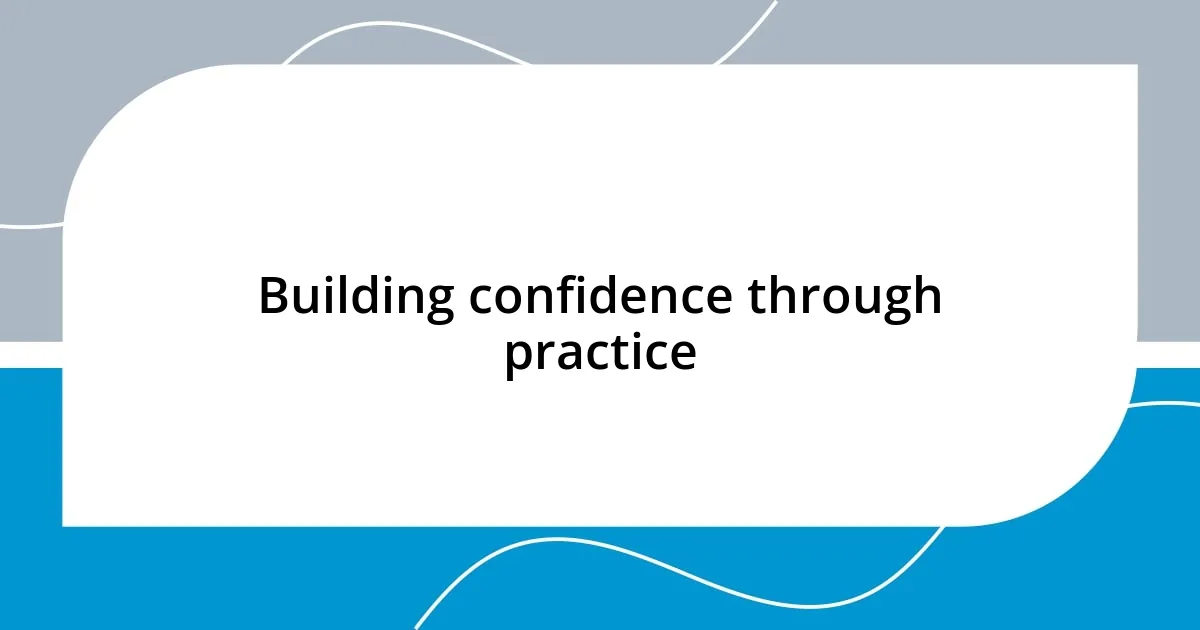
Building confidence through practice
Building confidence through practice has been a game-changer for me. I remember one particularly nerve-wracking rehearsal where I was stumbling over my words, drenched in sweat. But as I continued to practice, something shifted. Each repetition not only smoothed out my delivery but also made me feel more assured in my abilities. Have you ever noticed how mastering a skill grows your self-belief?
I find that incorporating deliberate practice is essential. Simply running through my lines or routines isn’t enough; I strive for focused, intentional sessions. For instance, during my preparation, I set aside time to work on the challenging parts, breaking them down until they feel second nature. This method truly enhances my confidence, and I can only keep reflecting on how I feel when I finally nail that tough section. Isn’t it incredible how mastering just one part can change the whole game?
There’s a profound impact in sharing practice sessions with trusted friends or colleagues too. One evening, I invited a few peers for a mock presentation, and their supportive feedback transformed my anxiety into excitement. They offered insights I hadn’t considered and celebrated my strengths, making me see myself, and my potential, in a whole new light. Can you recall a time when your practice transformed through collaboration? Those moments not only solidified my preparation but also built a community of support that fueled my confidence.
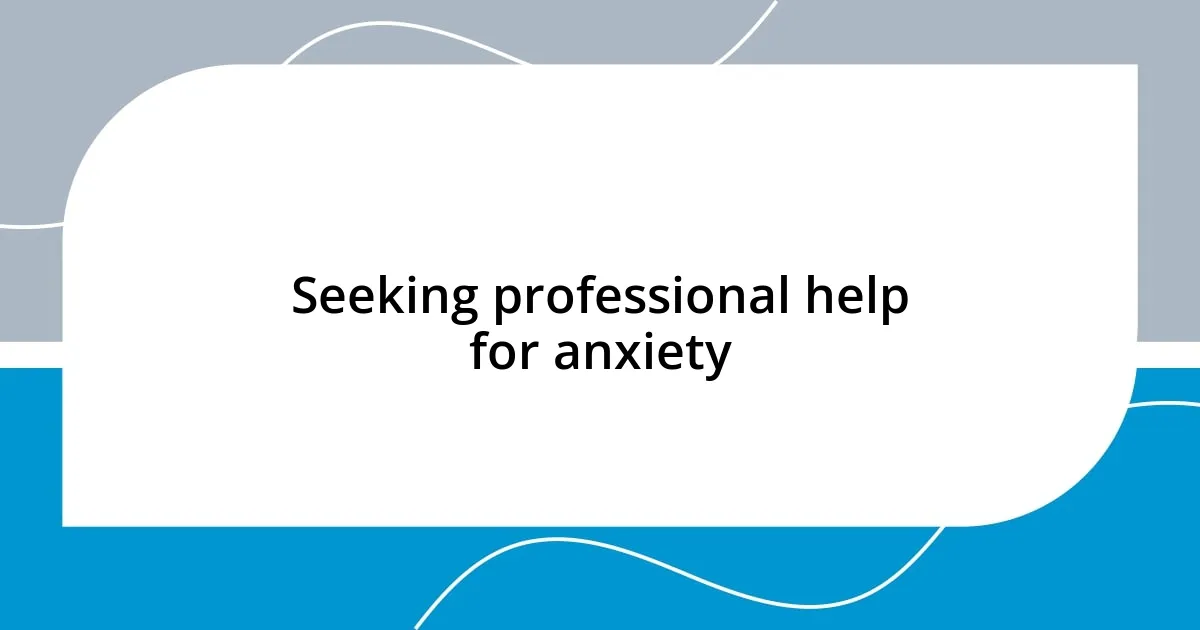
Seeking professional help for anxiety
Seeking professional help for anxiety can make a profound difference in navigating those overwhelming feelings. I once hesitated to reach out to a therapist, thinking I could handle it on my own. However, after just a few sessions, I realized that having someone guide me through my thoughts opened up new perspectives I never considered. Have you ever felt like a good talk could lift a weight off your shoulders?
Therapy provided me with invaluable coping strategies tailored specifically for my needs. I recall this one technique—the 5-4-3-2-1 grounding exercise—where I learned to identify my surroundings to bring myself back to the present moment. This simple practice helped shift my focus away from racing thoughts and into a space of awareness. It’s almost mind-blowing how reconnecting with your senses can bring a sense of calmness; do you have a strategy that works for you?
Additionally, speaking with a professional not only validated my feelings but also helped me break down my anxiety into manageable parts. I vividly remember discussing my fear of judgment, and with their support, I transformed that fear into motivation to improve. Instead of dreading the spotlight, I began to embrace it as an opportunity to share my voice. Isn’t it amazing how an external perspective can change the narrative we tell ourselves?






